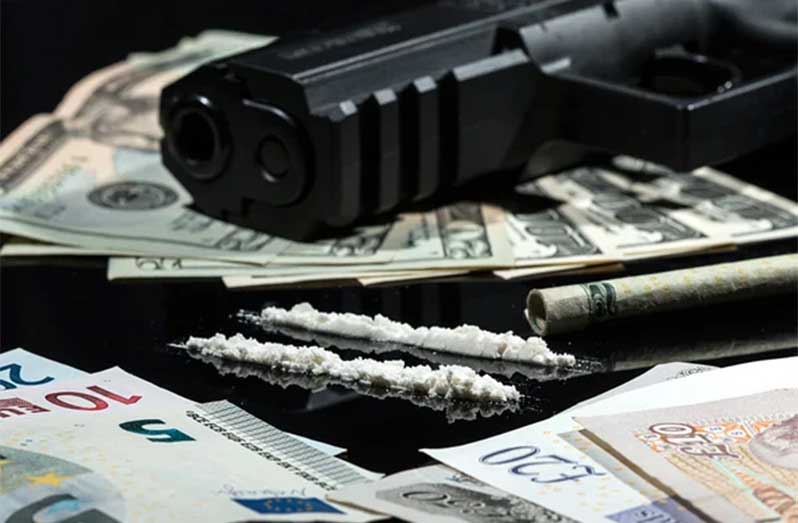–President Ali tells CARICOM summit, lobbies for more international support to tackle drugs, gun smuggling
–highlights region’s commitment, efforts to strengthening border, port security
INTER-AGENCY collaboration and international support are crucial to combatting transnational crime in the Caribbean, and while regional leaders have made progress in enhancing their respective security systems, more will be required to tackle the smuggling of guns and drugs into the region.
This is according to Guyana’s President and outgoing Chairman of the Caribbean Community (CARICOM) Dr. Irfaan Ali during his address at the 47th Regular Meeting of the Conference of Heads of Government of the Caribbean Community in St. George’s, Grenada, on Sunday.
He said that leaders in the region remain committed to strengthening border security.
“We have to ensure we build stronger systems so our borders are not used as tools to affect other borders and other countries. We have to fight the drug trade, we have to fight transnational crime and to do that we have to invest in security; we have to invest in border protection. We have to invest in port security, we have to meet all international standards and we are committed to doing so,” the Guyanese Head of State said.
President Ali noted that while regional leaders have acknowledged these challenges, special assistance is required, along with significant investments.
“… we must also ask for some more to be done in ensuring the guns that are coming into our system are not coming into the system,” President Ali said.
US ASSISTANCE
Just last week, Guyana’s Vice-President, Dr. Bharrat Jagdeo, at a news conference, told reporters that while joint operations here in Guyana have recorded successes, there is need for greater United States assistance to address the flow of weapons into the region.
“A lot of the weapons come in from the United States of America; they come in through barrels and all sorts of things. And so, this is not a new position; it’s been expressed overwhelmingly by CARICOM,” Dr. Jagdeo said while stressing the importance of a symmetrical relationship between Guyana and the US to tackle transnational threats together.
Meanwhile, Jagdeo has noted that the Guyana Police Force and other joint services have recorded tremendous successes. In recent weeks, several major crime circles were busted as a result of inter-agency operations here.
“The successes of the Police Force, and, by extension, the Joint Services, is because of the hard work of many people in these agencies; the inter-agency collaboration that’s taking place between all the agencies that deal with Security and fighting crime and transnational crime in Guyana. And so, they have strengthened their intelligence,” Dr. Jagdeo said.
“They have targetted operations, and you’re seeing success from this. The fact that you see a see a lot of seizures of weapons here is because of that collaboration with our partners. But also, we still need to get more support from our external partners,” he added.
It was recently reported by this newspaper that joint operations among several key regional partners have recently led to the seizure of US$3 million worth of cocaine, and US$2.1 million worth of marijuana in the region.
President Ali, during a press conference, had disclosed that Guyana has ongoing collaborations with CARICOM IMPACS, the Brazilian Federal Police, the Colombian task force, and the Regional Security System (RSS) and several other major partners. It was these collaborations, he said, that had led to the significant drug seizures, arrests and disruptions of major drug trafficking networks.
With the support of additional partners from the United Kingdom, France, Brazil, and CARICOM, Guyana has been strengthening its border security and surveillance system.
The Customs Anti-Narcotic Unit (CANU) has strengthened its operation at key border and port points through enhanced collaboration with the Cheddi Jagan International Airport (CJIA) and the Eugene F. Correia International Airport (OGL), and the Maritime Administration Department (MARAD) to combat drug trafficking.
CANU has also been keeping a close eye on the increased flights and destinations.
Recently, CANU disclosed that significant strides have been made in combatting illegal narcotics.
During the 2023 period, the Unit recorded five international seizures, a testament to the strategic measures being implemented at the various ports of entry countrywide.
In 2023 also, the Unit cleared approximately 1363.28 kilogrammes of narcotics, consisting of cannabis, cocaine, ecstasy, and hashish totalling $461.5 million. Cannabis was the most confiscated drug, accounting for 94 per cent of the total narcotics seized for the year, with approximately 73 separate seizures amounting to 1,287.88 kilogrammes.
There were 18 seizures of cocaine amounting to 75.17 kilogrammes, three seizures of ecstasy totalling 0.124 kilogrammes, and one seizure of hashish to the tune of 0.102 kilogrammes.
The cannabis that was confiscated had an estimated value of $386.3 million, whereas the cocaine’s value reached $475.1 million.


.jpg)











